My classic Victoria sponge cake is the best Victoria sponge cake recipe, tried and tested over many years of baking. This step by step guide will have you producing the best Victoria sandwich cake every time you bake.
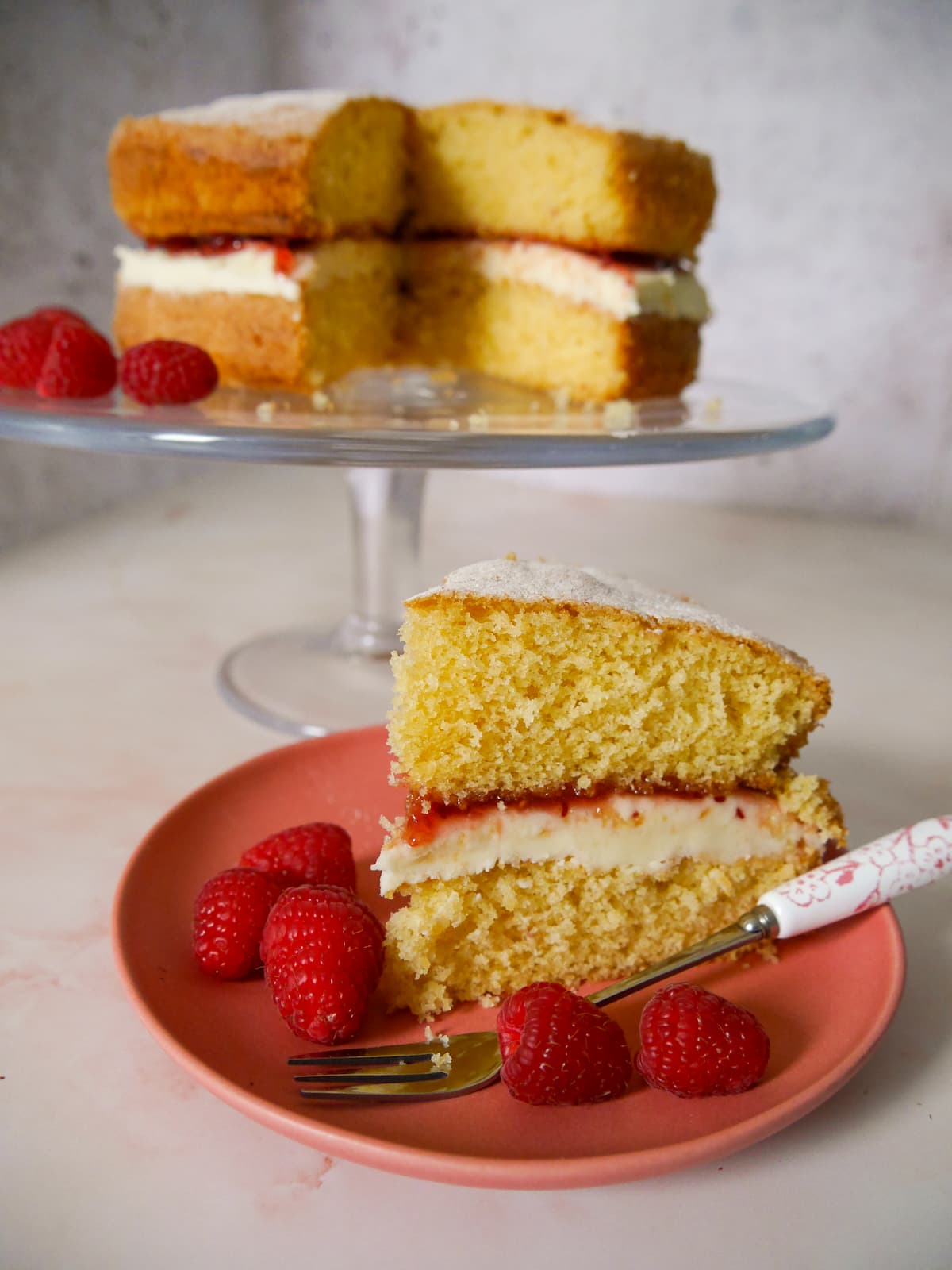
I make my Victoria sandwich using the creaming method, which starts by creaming together the fat and sugar. I’ve experimented with using both butter and margarine when baking sponge cakes, to see which give me the best rise and lightest cake.
When making this simple sponge cake recipe, I always use baking margarine as it results in a far lighter texture and fluffy sponge cake. Mary Berry uses margarine in sponge cakes for this very reason and I have to say it works.
Egg sizes vary so I like to weigh out my eggs for my Victoria sandwich, adding the same weight of eggs as I do margarine, sugar and flour, ensures a good rise to the cakes. I was given this tip years ago by an experienced baker and it really does result in consistently good cakes every time you bake.
Why you’ll love this recipe
- A simple Victoria sandwich is a great recipe for novice bakers, as it’s not a complicated bake.
- Make ahead by baking the sponge cakes the day before then they can be wrapped in baking parchment and a layer of clingfilm until you are ready to finish icing.
- No fancy equipment required this easy chocolate sponge cake can be made with just a bowl, a wooden spoon and a bit of elbow grease!
- A versatile cake as you can fill it any way you wish, from jam and buttercream, to fresh strawberries and whipped cream.
Recipe ingredients
Victoria sponge ingredients
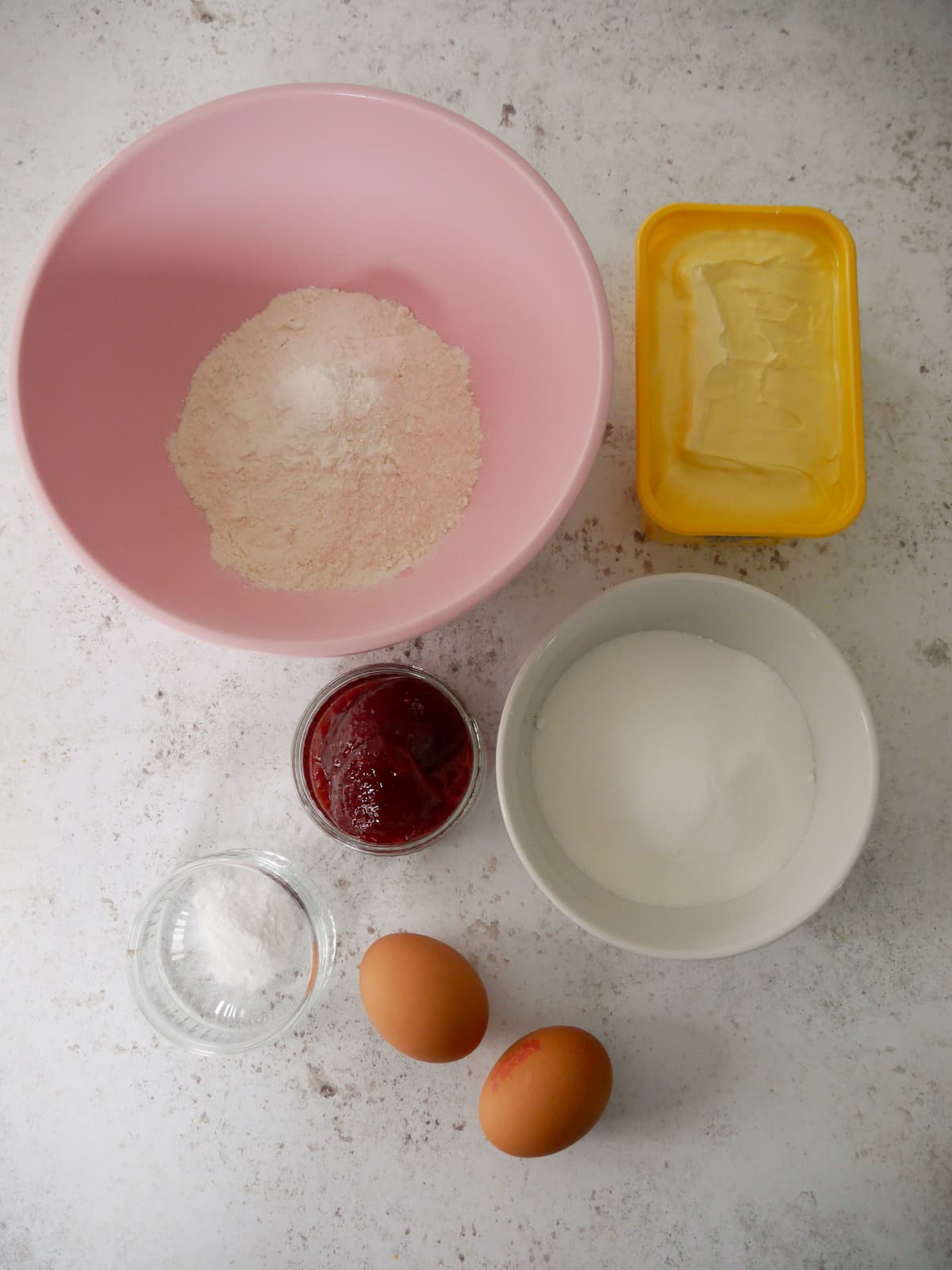
- Caster sugar: has a light texture making it ideal for baking. You can also use golden caster sugar in this recipe.
- Margarine: is something I always use when baking a sponge cake as it results in a far lighter, fluffier cake and you really will notice the difference. However, if you prefer you can substitute the margarine for some softened unsalted butter instead.
- Flour: I use self raising flour in this cake, which results in a great light texture.
- Eggs: I use free range eggs when baking.
- Baking powder: I like to add a level teaspoon of baking powder to help give the sponge a little lift.
- Jam: I filled the cake with raspberry jam, but you can use any flavour of jam.
TOP TIP: Don’t be heavy handed with the baking powder, only add what is asked for otherwise you can end up with a cake that will rise too quickly in the oven and then collapse!
Buttercream ingredients
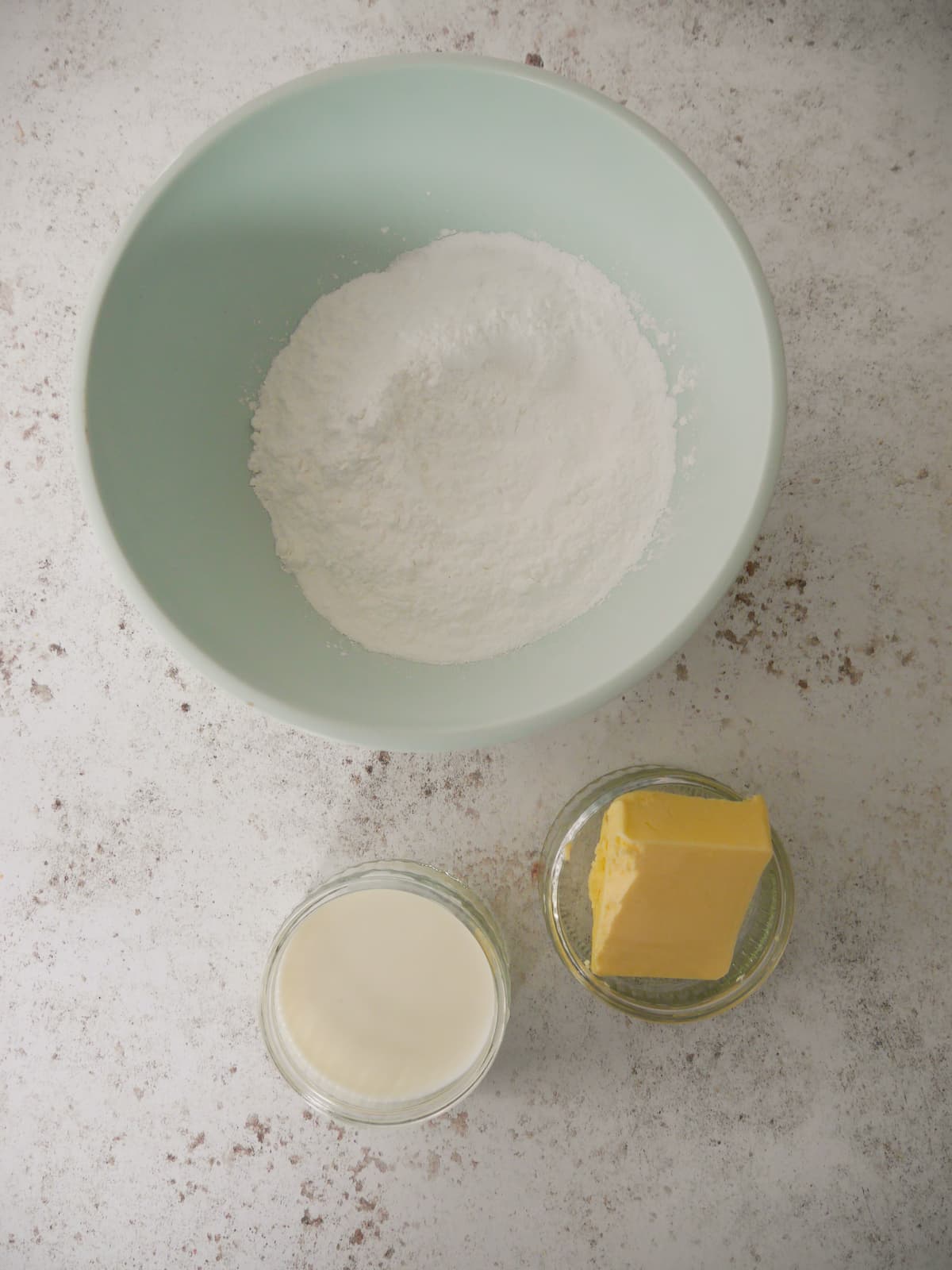
- Icing sugar (powdered sugar): is the best sugar for baking butter cream as it has a really fine texture.
- Butter: I use unsalted butter when making buttercream, although salted can work too.
- Milk: I use just a tablespoon or two of milk to loosen the buttercream to a spreading consistency.
TOP TIP: When creaming butter always bring it out of the fridge at least 30 minutes before you need it to allow it time to soften. This will make it much easier to beat to smooth.
How to make a classic Victoria sponge
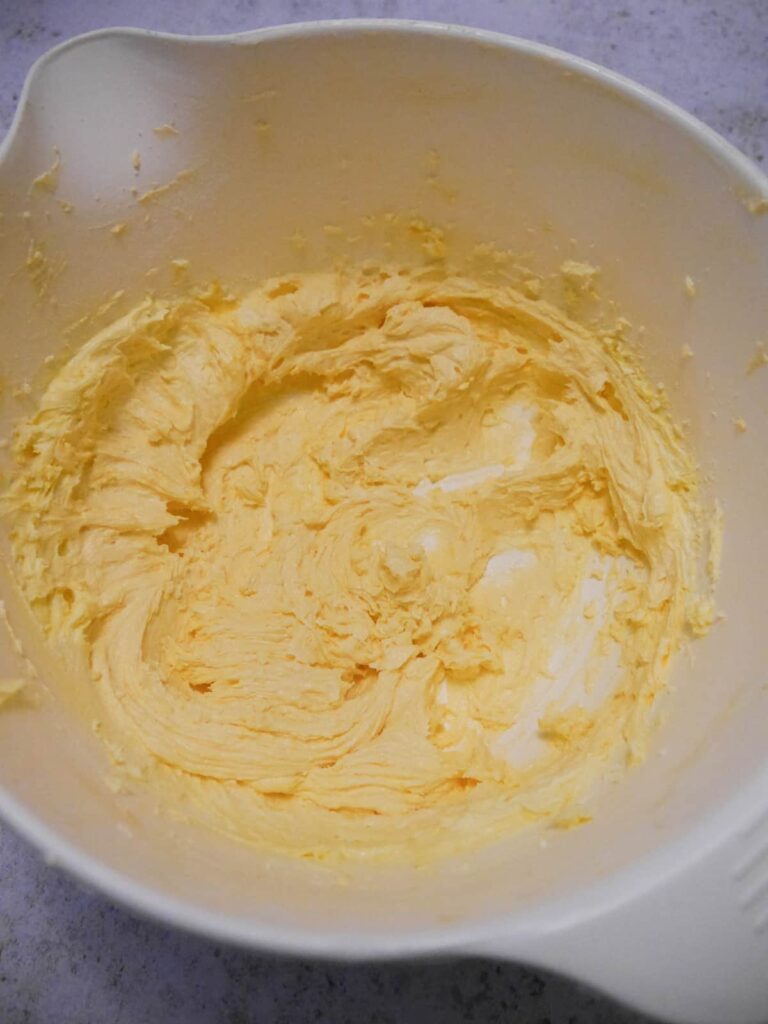
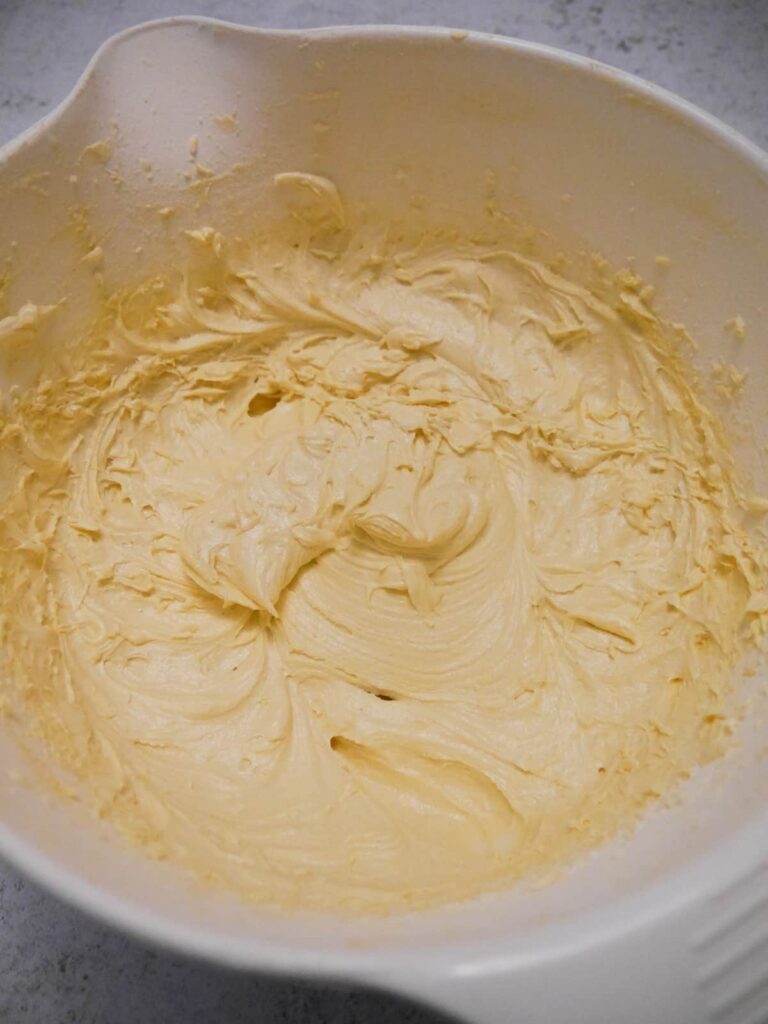
- Preheat the oven to 170C/150CFan/340F. Grease and flour 2 x 25cm (10″) round sandwich tins and line the base with baking paper.
- Using a mixer cream together the sugar and margarine until completely combined and very pale in colour.
- Add in the beaten egg and mix gently to combine.
- Sieve the flour and baking powder into the mixing bowl and beat together until well combined.
TOP TIP: Always sieve the flour into the mixing bowl as it adds airiness and therefore extra air into the batter, resulting in a better rise.
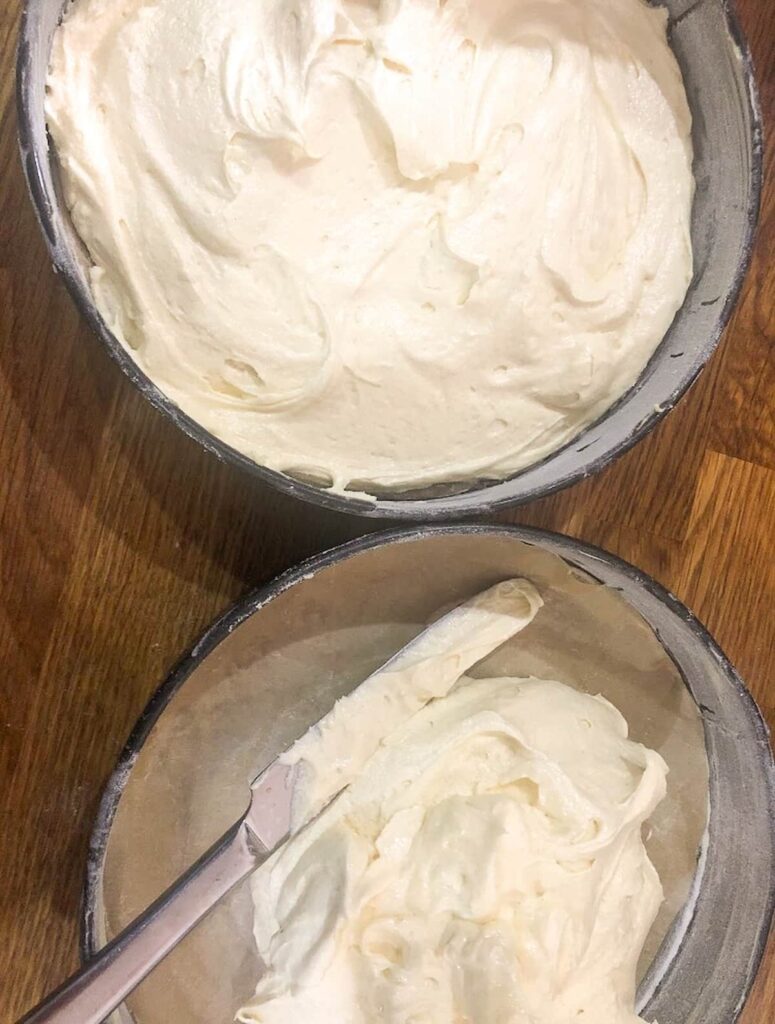
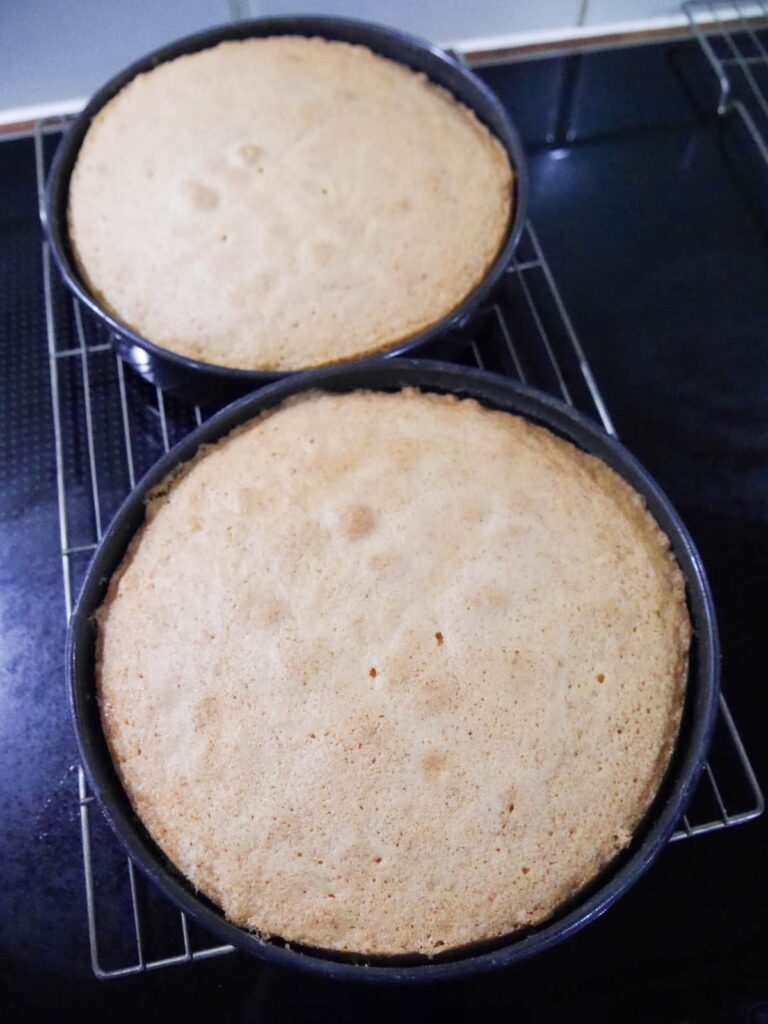
- Spoon the cake mixture evenly between the tins.
- Bake on the middle shelf of the preheated oven for 40 minutes.
- After 40 mins insert a toothpick into the centre of each sponge and it if comes out clean the sponge is baked, if not return to the oven and continue baking until done.
- Leave the sponge cake in the tin to cool for 5 minutes then remove from the tin and place on a wire rack to to cool completely.
TOP TIP: For really even cakes, I like to weigh the cake batter into the tins, adding the same amount of cake batter into each tin.
How to make buttercream (butter icing)
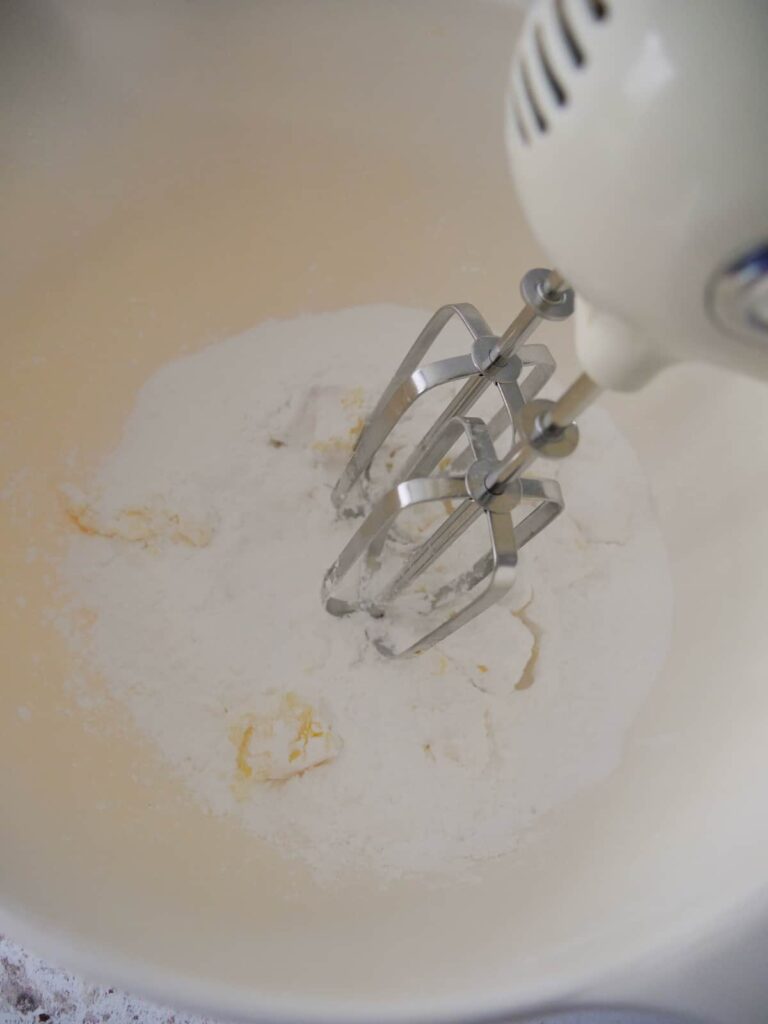
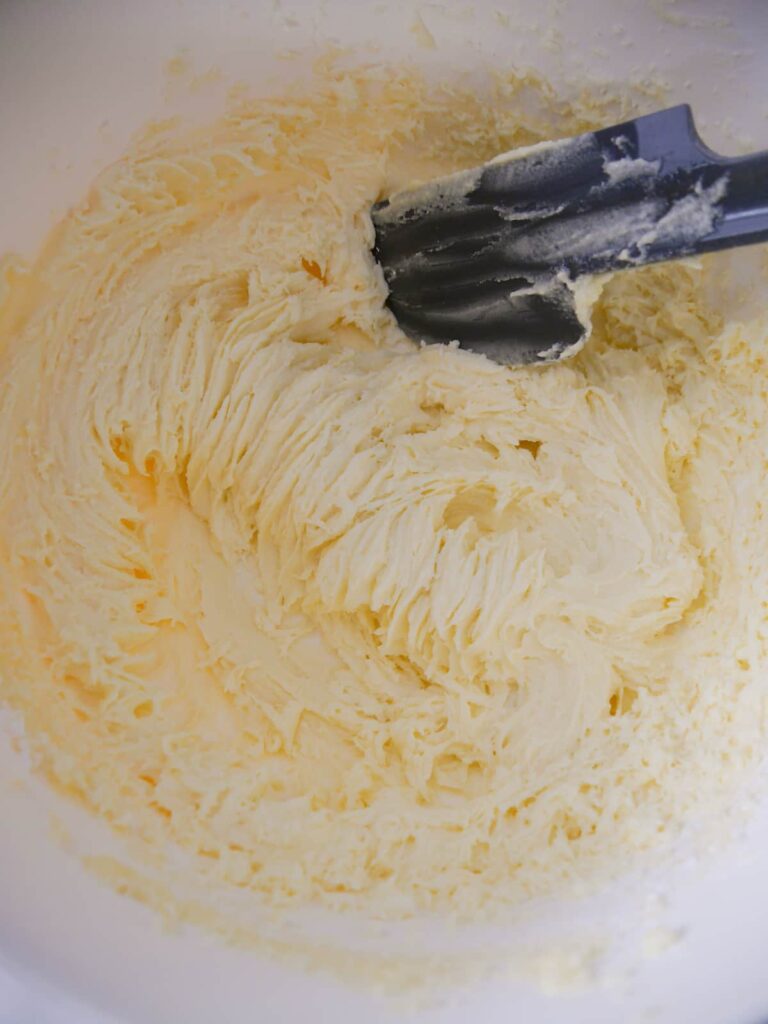
- To make the buttercream filling put the soft butter in a mixing bowl and beat with a whisk until very creamy and light in colour.
- Sift in the icing sugar and add the milk, gently beat together until very smooth.
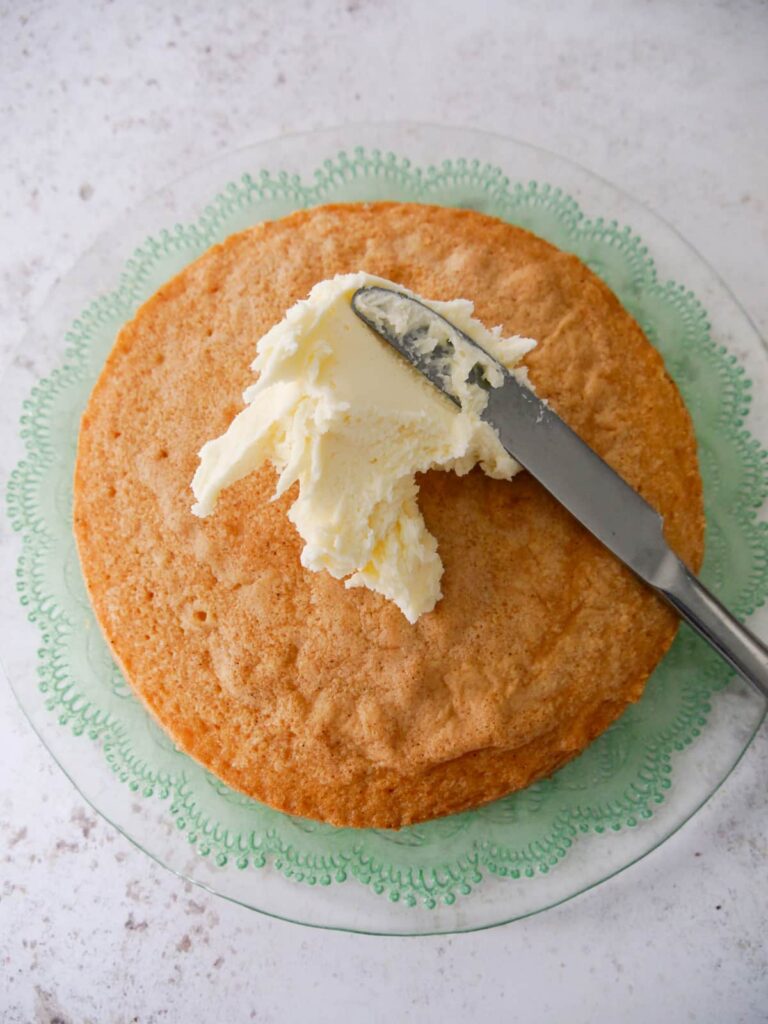
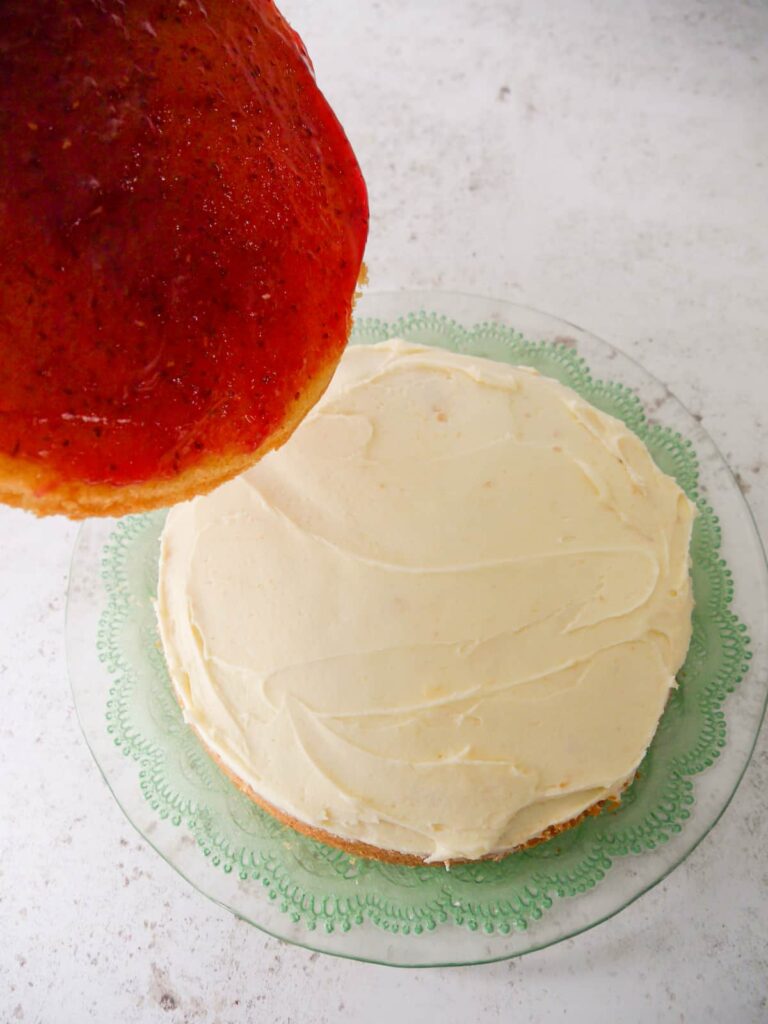
- Once the cake is cool spread one cake with a layer of buttercream and place icing side up on a plate.
- Take the second sponge and spread with a layer of jam before sandwiching both sides together together.
- Finally, dust the top of the sponge with a light sprinkling of icing sugar to decorate. Slice and serve.
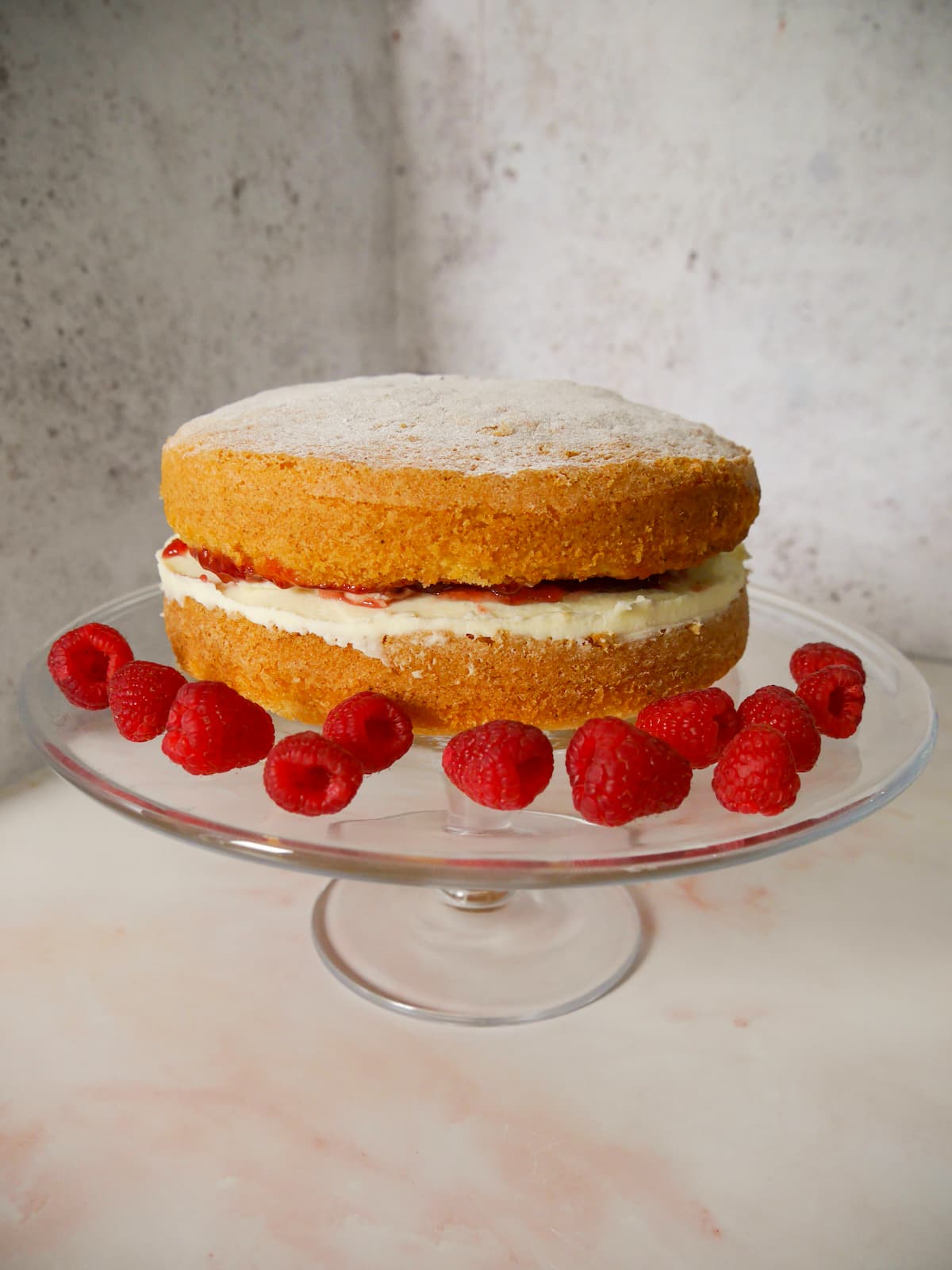
Recipe variations
This classic Victoria sponge is sandwiched together with a layer of raspberry jam and buttercream and finished with a dusting of icing sugar. However, you can easily adjust the filling to suit your own tastes. Here are some ideas:
- Use any flavour jam: raspberry, strawberry, blackcurrant; rhubarb
- Flavour the the butter cream by adding cocoa powder; citrus zest; fruit extracts
- Swap buttercream for a chocolate ganache
- Try chocolate buttercream with raspberry jam
- Swap jam for lemon curd and add a lemon zest flavoured buttercream
- Swap buttercream for fresh whipped cream and jam for slices of freshly sliced and macerated strawberries, or add raspberries or blueberries.
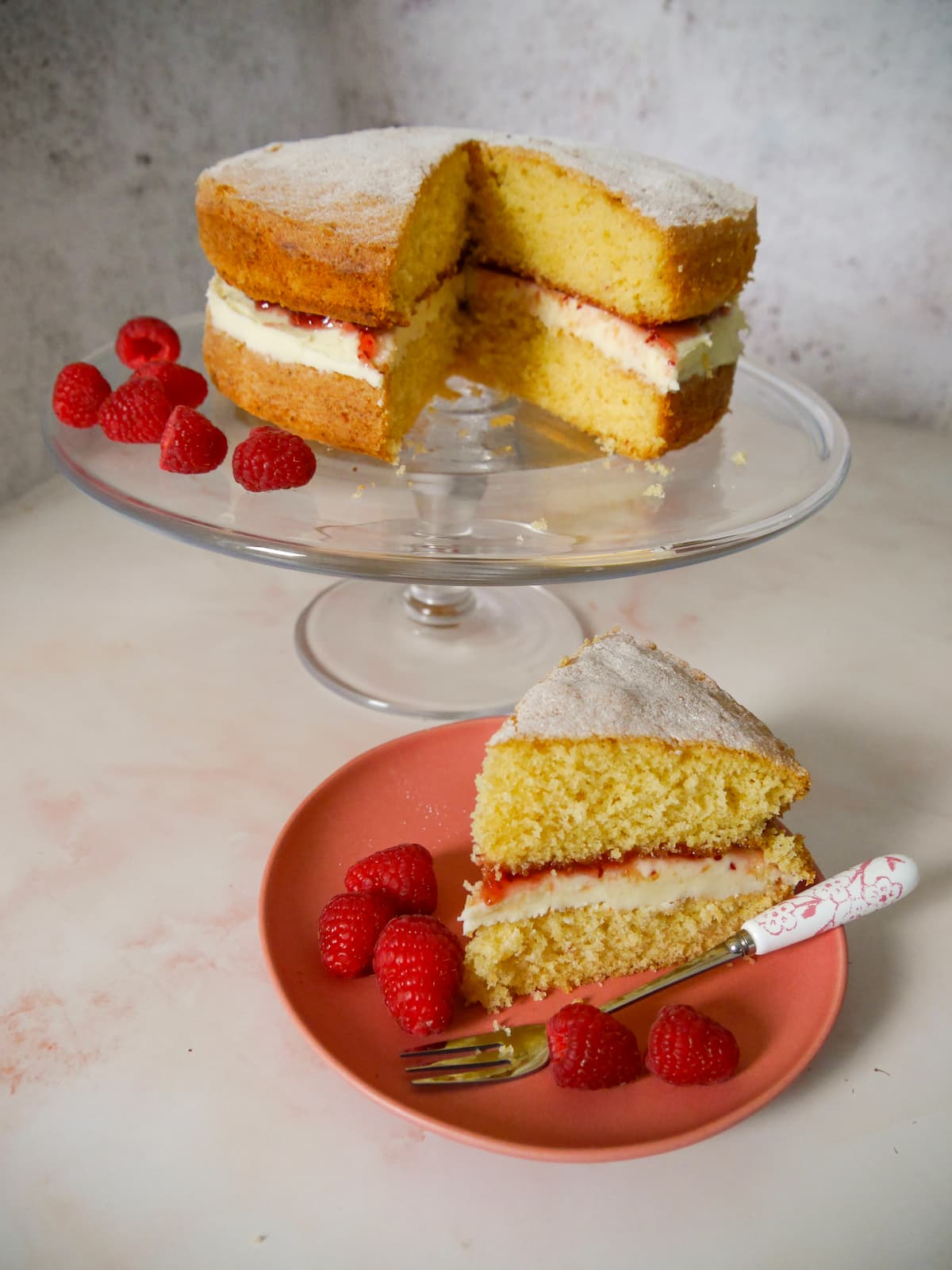
Useful hints and tips
- Accurately weigh the ingredients: the trick to baking is always to accurately weigh out your ingredients. You can be creative when cooking, adding a little extra here and there. However, baking is a science, if you want a light sponge cake weigh everything out accurately.
- Take time to properly cream the margarine and sugar together as this will result is a lovely even, light baked cake.
- Always weigh out your eggs! I was given this tip years ago by a coffee shop owner in the Peek District who baked the best cakes I have ever eaten. It might sound like a chore, but it will result in consistently good cakes if you take the time to weigh your eggs. Eggs vary in size and weight so always weigh out your eggs when making sponge cake. This ensures a good rise as you are using the same weigh of eggs to flour, margarine and sugar.
- To weigh eggs, I recommend cracking them first into a bowl then removing a little excess egg. It will work fine if it is just a little under or over.
- No special equipment required, so don’t worry if you don’t have a stand mixer, a hand mixer will work just as well and is what I often use. You can also use a wooden spoon to cream everything together, you just have to work a bit harder.
- Loose bottomed cake tins make baking cakes a lot easier. The loose bottom allows you to pop the cakes straight out of the tin without too much handling.
- Lining the baking tins could not be easier. I like to first grease my tins with some softened margarine, then dust them with flour before lining the base with a circle of baking parchment. You can completely line the tin if you prefer or use a special cake release spray.
- Allergy advice: soya free and nut free. For comprehensive and detailed allergy advice go to Allergy UK.
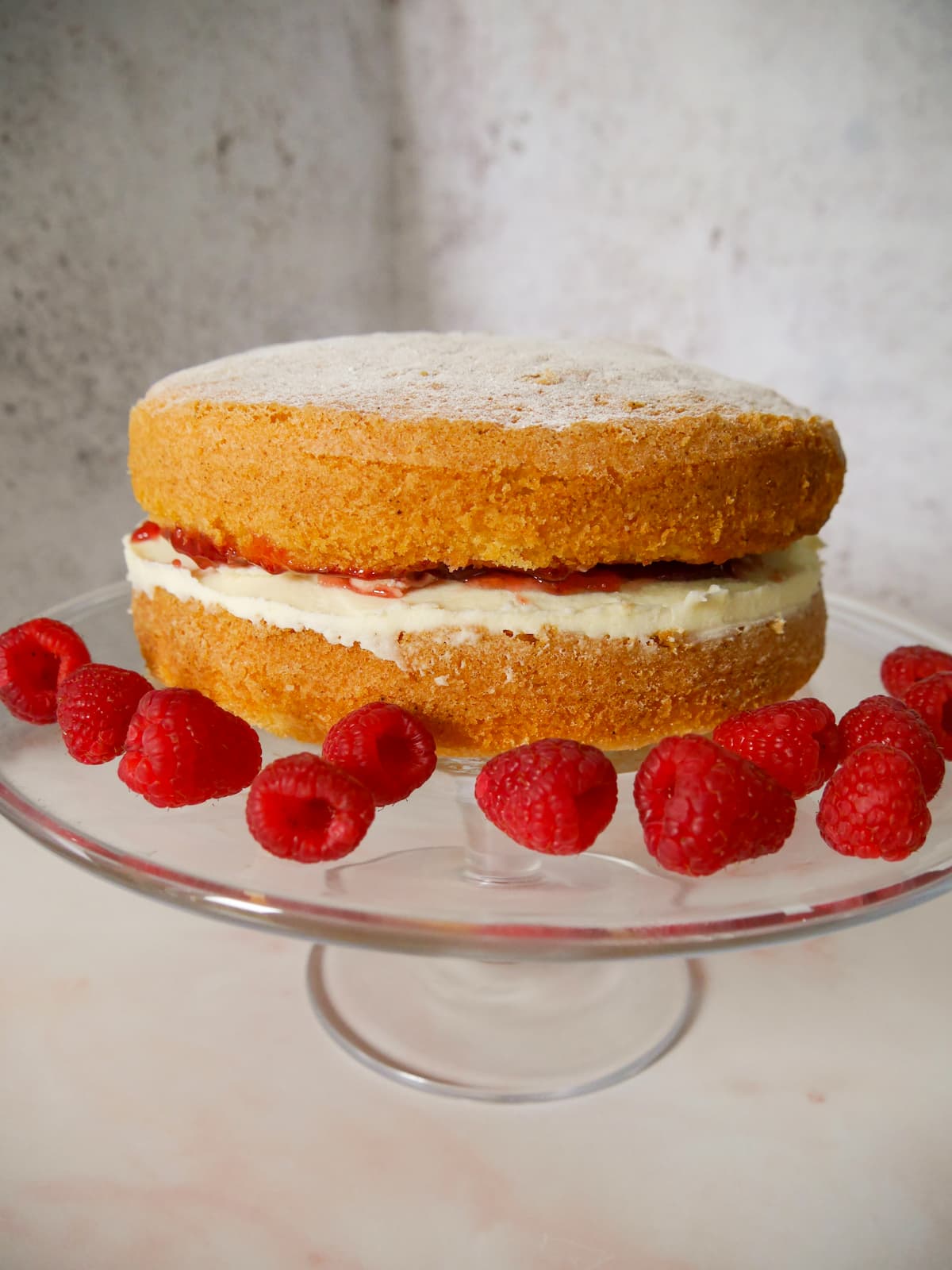
FAQs
There are a number of reasons for a flat sponge cake. Firstly add just the right amount of baking powder, too little and it won’t rise, too much and it will rise too quickly and then collapse. Don’t under whisk the cake batter, but likewise don’t knock all the air out either, just enough to form a thick and creamy batter. Finally make sure you put it into a preheated oven at the right temperature.
Don’t over-bake the cakes, leave the cakes in the oven too long and the sponge will start to dry out. Cook only until a toothpick inserted into the centre of the cake comes out clean, then remove to a wire rack to cool for 5 minutes, before turning the cakes out of the tin and allowing to cool completely.
Once iced, place in a large airtight cake tin or box and store for 2-3 days.
Whilst I don’t recommend freezing the whole cake, you can freeze the individual sponge cakes. Cover in baking parchment, wrap with clingfilm and place into a large airtight freezer bag. Store the cakes in the freezer for up to 3 months. When ready to enjoy, remove and defrost thoroughly before icing.
Pin the recipe
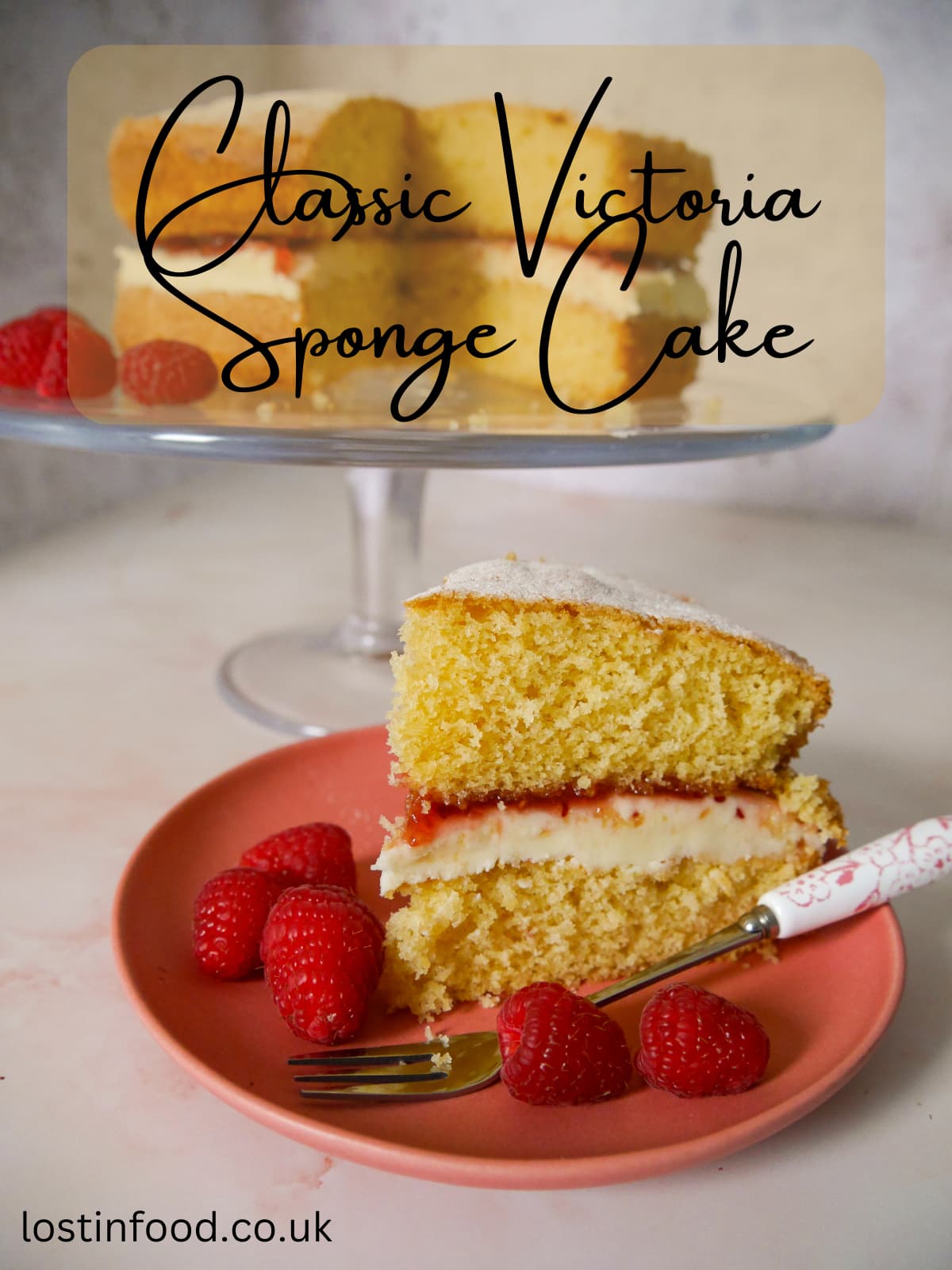
Additional recipe suggestions
If you love baking then try some of my favourite cake recipes:
- Chocolate Victoria Sponge Cake
- Blood Orange Cake
- Chocolate & Pecan Brownies
- Custard Creams
- Easy Banana Bread
- Chocolate & Hazelnut Cookies
If you enjoyed this bake have a look at my Best Cake Recipes post, where you will find lots of useful hint and tips as well as a selection of my favourite cake recipes.
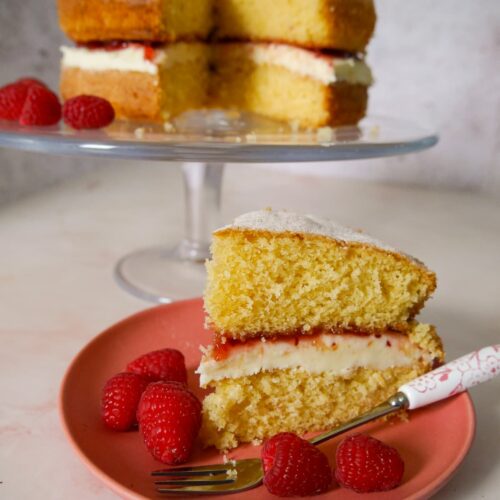
Classic Victoria Sponge Cake
Equipment
- large mixing bowl
- Electric hand whisk
- measuring spoons
- weighing scales
- Wooden spoon
- Spatula
- 2 25cm (10") round sandwich tins
Ingredients
Sponge cake
- 250 g caster sugar
- 250 g baking margarine
- 250 g self raising flour
- 250 g egg (beaten)
- 1 level tsp baking powder
- 3-4 level tbsp raspberry jam
Buttercream
- 200 g icing sugar
- 65 g unsalted butter (softened but not runny)
- 1-2 tbsp milk
Instructions
Baking the Victoria sponge
- Preheat the oven to 170C/150CFan/340F. Grease and flour 2 x 25cm (10") round sandwich tins and line the base with baking paper.
- Using a mixer cream together the sugar and margarine until completely combined and very pale in colour.
- Add in the beaten egg and mix gently to combine.
- Sieve the flour and baking powder into the mixing bowl and beat together until well combined.
- Spoon the cake mixture evenly between the tins.
- Bake on the middle shelf of the preheated oven for 40 minutes. After 40 mins insert a toothpick into the centre of each sponge and it if comes out clean the sponge is baked, if not return to the oven and continue baking until done.
- Leave the sponge cake in the tin to cool for 5 minutes then remove from the tin and place on a wire rack to to cool completely.
Making buttercream icing
- To make the buttercream put the soft butter in a mixing bowl and beat with a whisk until very creamy and light in colour. Sift in the icing sugar and add the milk, gently beat together until very smooth.
- Once the cake is cool spread one cake with a layer of butter icing and place icing side up on a plate.
- Take the second sponge and spread with a layer of jam before sandwiching both sides together together.
- Finally, dust the top of the sponge with a light sprinkling of icing sugar to decorate. Slice and serve.
Notes
- I’ve experimented using both butter and baking margarine for baking sponge cakes, and the baking margarine always results in a lighter sponge cake.
- However, when it comes to the best flavour for buttercream icing, I always use unsalted butter.
- Accurately weigh the ingredients, baking is a science, if you want a light sponge cake weigh everything out accurately.
- Take time to properly cream the margarine and sugar together as this will result is a lovely even, light baked cake.
- Always weigh out your eggs! I was given this tip years ago by a coffee shop owner in the Peek District who baked the best cakes I have ever eaten. It might sound like a chore, but it will result in consistently good cakes if you take the time to weigh your eggs. Eggs vary in size and weight so always weigh out your eggs when making sponge cake. This ensures a good rise as you are using the same weigh of eggs to flour, margarine and sugar.
- To weigh eggs, I recommend cracking them first into a bowl then removing a little excess egg. It will work fine if it is just a little under or over.
- Loose bottomed cake tins make baking cakes a lot easier. The loose bottom allows you to pop the cakes straight out of the tin without too much handling.
- Lining the baking tins could not be easier. I like to first grease my tins with some softened margarine, then dust them with flour before lining the base with a circle of baking parchment. You can completely line the tin if you prefer or use a special cake release spray.
• Please note that the nutrition information provided above is approximate and meant as a guideline only •

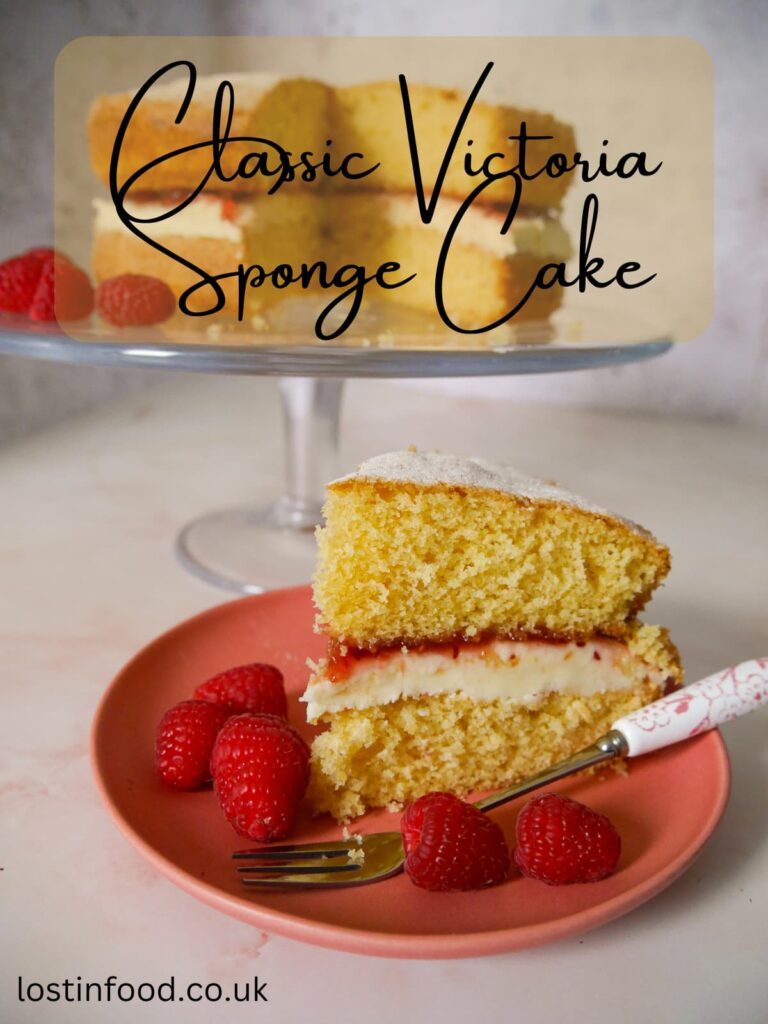
Becca
Thursday 4th of July 2024
Loved it ! Easy to follow recipe which always helps ! Can’t go wrong with a Victoria sponge !!
Lesley
Thursday 4th of July 2024
Thank you Becca, I'm glad you enjoyed the cake.
Molly
Tuesday 2nd of July 2024
I’ve baked this cake a few times now and it always comes out really well. I’ve never thought to weight my eggs before, but this method really works. The cake is always delicious.
Lesley
Thursday 4th of July 2024
Thank you Molly, I'm glad you enjoyed the cake.
Casey
Monday 1st of July 2024
Good tips... But I found 40 minutes far too long in my regular oven! After 30, the cakes were quite well done. They are quite thin, perhaps that's why, but I double checked all measurements (esp since I had to make my own self raising flour). Looking forward to eating the cake nonetheless!
Lesley
Thursday 4th of July 2024
Hi Casey, I guess everyone's oven differ and some have hot spots, I know mine does. It's best to keep an eye whilst the cakes are baking. Also making your own self raising flour may have had an effect, I tend to use regular store bought flour and they always rise fine. Each layer of sponge should rise to 2"/5cm in height. If you didn't have that sort of rise, then you might have overworked the cake batter which can result in a flatter cake.
Anna
Thursday 20th of June 2024
Really easy recipe to follow cake tasted really good would definitely bake again
Lesley
Thursday 4th of July 2024
Thank you Anna, I'm glad you enjoyed the cake.
jasmine
Friday 14th of June 2024
loved this recipe and very easy to follow along. will definitely come back to this in the future!
Lesley
Thursday 4th of July 2024
Thank you Jasmine, I'm glad you enjoyed the cake.